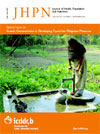
|
The Journal of Health, Population and Nutrition
icddr,b
ISSN: 1606-0997
EISSN: 1606-0997
Vol. 37, No. 1, 2018, pp. 1-9
|
 Bioline Code: hn18008
Bioline Code: hn18008
Full paper language: English
Document type: Research Article
Document available free of charge
|
|
|
The Journal of Health, Population and Nutrition, Vol. 37, No. 1, 2018, pp. 1-9
| en |
Determinants of postnatal care utilization in urban community among women in Debre Birhan Town, Northern Shewa, Ethiopia
Angore, Banchalem Nega; Tufa, Efrata Girma & Bisetegen, Fithamlak Solomon
Abstract
Background: Reducing maternal mortality and improving maternal health care through increased utilization of
postnatal care utilization is a global and local priority. However studies that have been carried out in Ethiopia
regarding determinants are limited. So This study aims to assess the magnitude of postnatal care utilization and its
determinants in Debre Birhan Town, North Ethiopia.
Methods: A community-based cross-sectional study was conducted from March 1 to April 25, 2015, in Debre
Birhan Town. Data were collected through face-to-face interviews using structured pre-tested questionnaires. The
data were entered and cleaned in Epi Info version 3.5 and analyzed using SPSS version 20. Bivariate and multiple
logistic regression analyses were used. Variable with p value less than or equal to 0.2 at bivariate analysis were
entered into multiple logistic regression. Significance was declared at 0.05 in multiple logistic regressions and
considered to be an independent factor.
Result: From the total respondents, we found that 327 (83.3%) mothers utilized the postnatal care services. Single
mothers were less likely to utilize postnatal care services than those mothers who are married and live together
[adjusted odds ratio (AOR) = 0.06, 95% CI (0.01, 0.45)]. This study revealed that respondent’s knowledge about postnatal
care services is an important predictor of postnatal care utilization [AOR = 0.03, 95% CI (0.00, 0.44)] and mothers who
delivered in a health care facility were more likely to receive PNC than mothers who did not deliver in a health care
facility [AOR = 0.65, 95% CI (0.58, 0.94)].
Conclusion: The postnatal care utilization rate in Debre Birhan town was 83.3%. Marital status, maternal knowledge, and
place of delivery were predictors of postnatal care service utilization. So specific attention should be directed towards the
improvement of women’s education since the perception of the need for PNC services were positively correlated with
the mother’s education.
Keywords
Women; Postnatal care utilization; Determinants; Debre Birhan; Ethiopia
|
| |
© Copyright 2018 - The Author(s)
Alternative site location: http://www.jhpn.net
|
|
